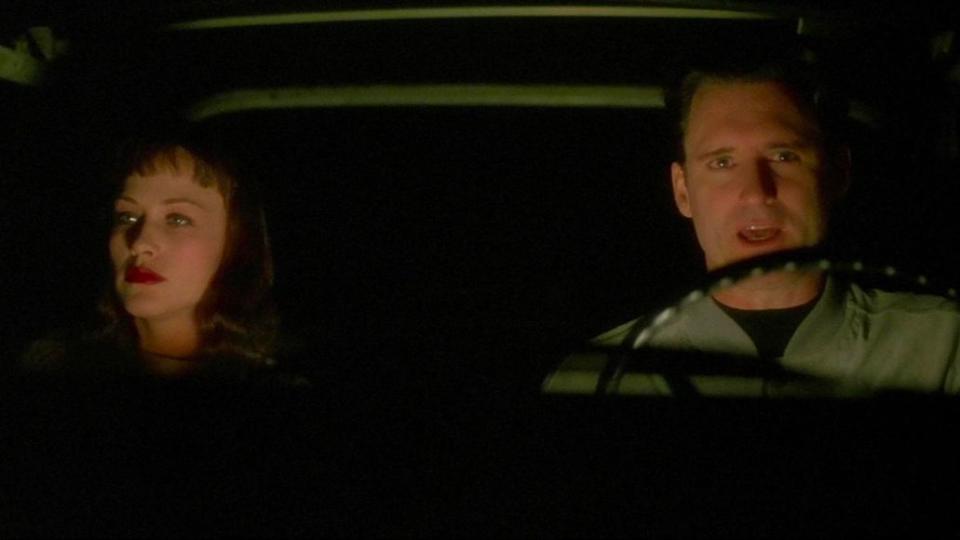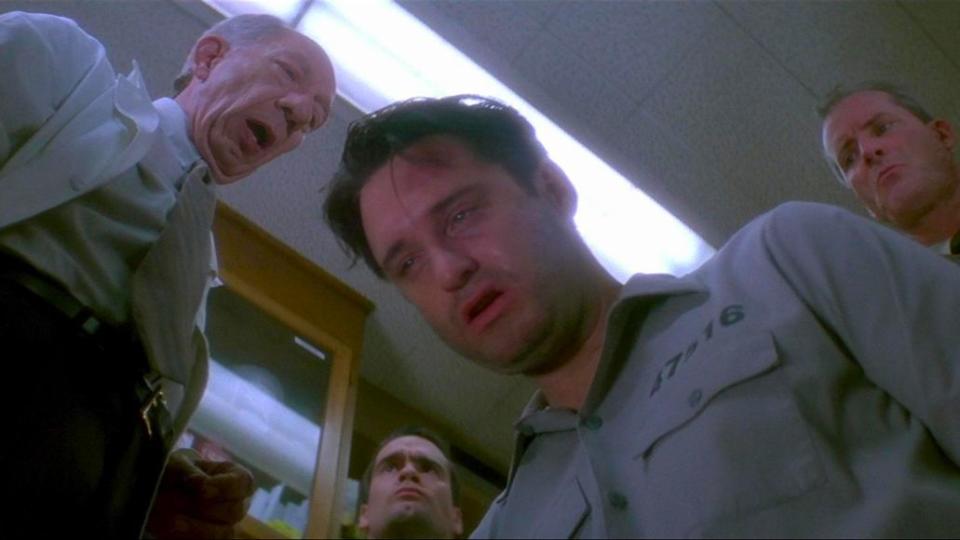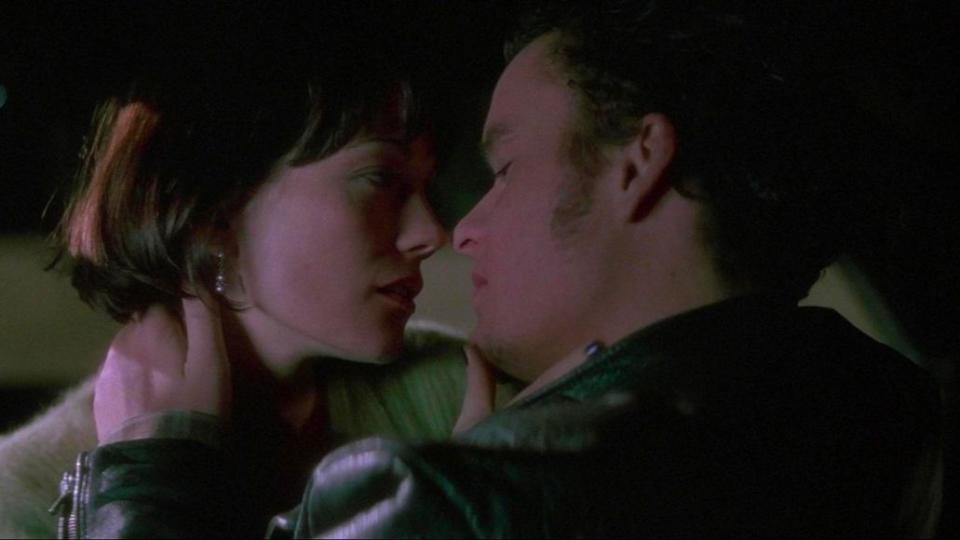25 Years Later, David Lynch’s Lost Highway Remains an Underappreciated and Nightmarish Neo-Noir Gem
- Oops!Something went wrong.Please try again later.
- Oops!Something went wrong.Please try again later.
- Oops!Something went wrong.Please try again later.
- Oops!Something went wrong.Please try again later.
The post 25 Years Later, David Lynch’s Lost Highway Remains an Underappreciated and Nightmarish Neo-Noir Gem appeared first on Consequence.
David Lynch is rightly considered among the most impenetrably bizarre and allegorical filmmakers of his generation; however, there’s always a resolutely singular sense of authorship and intention to his work (even if he’s literally the only person who knows what he’s trying to say).
That’s as true of 1977’s pioneering Eraserhead and 1986’s revered Blue Velvet as it is 1999’s comparatively conventional The Straight Story and 2006’s maligned Inland Empire. It’s certainly also valid for what’s perhaps his most unjustly disparaged creation: 1997’s Lost Highway.
Celebrating its 25th anniversary this week, Lost Highway arrived in the midst of a career slump for Lynch. Neither 1990’s Wild at Heart nor 1992’s Twin Peaks: Fire Walk with Me earned the same kind of accolades as his 1980s run of films (well, 1984’s Dune notwithstanding), and even Lynch surmises that the obligatory second season of his groundbreaking Twin Peaks T.V. show — co-created by Mark Frost — lost its way (to put it nicely).
Despite all of these projects being subsequently reevaluated in positive ways, at the time, they represented a perceived decline in creative ability and commercial marketability.
Of course, Lost Highway didn’t exactly reignite Lynch’s star, either, as it was similarly met with mixed professional reviews and befuddled audience reactions. Like those divisive predecessors, though, it warrants far more praise than it’s received. Full of trademark mysterious imagery, cryptic plot points, devious characters, and surreally sinister sound design, it soars as Lynch’s most overtly neo-noirish statement.
Beyond that, it serves as a remarkable bridge between his earlier works’ deconstruction of deceptively wholesome communities and the glitzier corruptions of innocence and identity that also permeate the rest of his Los Angeles trilogy (2001’s Mulholland Drive and Inland Empire).
Much has been written about the narrative and meaning of Lost Highway, with wildly different interpretations testifying to both its intentional obfuscation and its place as a perfectly fitting entry into Lynch’s uniquely dreamlike yet discordant and ambiguous oeuvre.
Lost Highway follows a domineering and sexually frustrated saxophonist named Fred Madison (Bill Pullman). who’s sentenced to death for murdering his timid but ostensibly unfaithful wife, Renee (Patricia Arquette).
Rather than admit comprehension and guilt, Fred claims that he has no memory of what happened, and he disappears into an alternate existence wherein he and Renee become new people (Pete and Alice, respectively) and inadvertently embark on another kind of doomed romance.

Lost Highway (October Films)
Along the way, other important people from their real-life are reimagined, and an ominous Mystery Man — who’s been sending the couple ominous footage of their home — proves to be a relentlessly foreboding yet integral presence in all realities.
Obviously, that’s a reductive rundown begging for elaboration and/or disagreement. In fairness, though, even the main actors had their own interpretations and doubts.
“[Lynch] has the courage and the honesty to explore the horror that lies within every human being… [Lost Highway] is about the obsession to own someone,” Pullman once explained, while Arquette concluded: “ I think it’s about a man trying to recreate a relationship with the woman he loves so that it ends up better. Fred recreates himself as Pete, but the element of distrust in him is so strong that even his fantasy turns into a nightmare.”
Natasha Gregson Wagner — who played Pete’s devoted but ultimately betrayed girlfriend, Sheila — added: “I wouldn’t say that I understand the script completely, but I like that. . . . We all have our own fantasies about what the secret . . . is.”
Co-writer Barry Gifford (who wrote the Wild at Heart novel and whose 1992 book, Night People, inspired Lost Highway’s title) offered a somewhat basic clarification during the film’s promotional cycle:
“Let’s say you don’t want to be yourself anymore. . . . Something happens to you, and you just show up in Seattle, living under the name Joe Smith, with a whole different reality. It means that you’re trying to escape something, and that’s basically what Fred Madison does. He gets into a fugue state, which in this case means that he can’t go anywhere – he’s in a prison cell, so it’s happening internally, within his own mind. But things don’t work out any better in the fugue state than they do in real life. He can’t control the woman any more than he could in real life. You might say this is an explanation for what happens. However, this is not a complete explanation for the film. Things happen in this film that are not – and should not be – easily explained.”
In contrast, Lynch was — as usual — proudly enigmatic in his 2018 chat with Vulture. “I’d heard that after O.J. [Simpson] got off, he went golfing. And I thought, Here’s a guy who is able to compartmentalize: He brutally murders two people and then he’s out smiling, playing golf. They say that’s like a psychogenic fugue: where you mentally distance yourself from what you’ve done because otherwise you’d go crazy.”
The inspiration from the Simpson case is no doubt surprising, whereas Lynch’s desire to avoid “say[ing] too much” about Lost Highway (in order to have “a certain percentage [of the mystery] left over to keep the dream going”) is totally par for the course.
To Lynch’s credit, in telling two detectives, “I like to remember things my own way. How I remembered them, not necessarily the way they happened,” Fred simultaneously vindicates the illogical nature of Lost Highway and validates his place alongside Lynch’s career-spanning cast of unreliable narrators. Because it’s not meant to be wholly comprehended, the movie definitely requires dissection of its internal symbolism.

Lost Highway (October Films)
(For instance, was the unknown event from “the other night” the creation of Pete’s universe and everything in it? Is the Mysterious Man meant to embody the devil, fate, and/or Fred’s culpability and insecurity? After all, he tells Fred at a party that they’ve previously met at Fred’s house, elucidating: “You invited me. It is not my custom to go where I am not wanted.”)
That said, the film’s external connections to Lynch’s other work — past and future alike — are even more enticing. In fact, there are far too many links (thematically, stylistically, etc.) to go over here. Suffice it to say, though, that Fred’s overlapping role as naïve victim and familial murderer marks him as a mixture between Blue Velvet protagonist Jeffrey Beaumont and Twin Peaks antagonist Leland Palmer.
Likewise, Arquette’s bisection (into the meekly frightened Renee and the secretly scandalous Alice) evokes the duality of Laura Palmer’s public and private lives, and the theme of hiding sinisterness beneath a seemingly pure surface conjures those two titles and Wild at Heart. (Naturally, the rock ‘n’ roll love affair between Pete and Sheila conjures the latter film’s couple — Sailor Ripley and Lula Pace Fortune — too.)
Looking ahead, Fred is clearly a precursor to Mulholland Drive’s Betty Elms and Inland Empire’s Nikki Grace, as all three are struggling artists whose unfulfilled desires and perceived exploitation result in what Slate’s Dennis Lim aptly calls “nonlinear puzzle-movies in which the otherworldly ambiance and the rifts in space-time are a direct outgrowth of the protagonist’s mental trauma.”
Sure, prior projects featured swapped personalities, unsettlingly prophetic messengers, abstract visual/auditory storytelling, and other Lynchian staples, but it’s this “psychogenic fugue” trio that’s most transparent and unified.
Speaking of Lost Highway’s sights, it houses many of the filmmaker’s biggest trademarks. In particular, its recurring use of slow-motion, crossfades, red curtains, flashing blue lights, facial transformations, and tense voyages into dark spaces are quite familiar, and they’re as effectively frightening as ever at highlighting Fred’s sense of insecurity, insanity, and the like.
Plus, Lynch’s penchant for unexpected cameos (in this case, Richard Pryor, Henry Rollins, and Marilyn Manson); shocking violence and sexuality; and comically odd distractions (such as Robert Loggia’s Mr. Eddy assaulting a tailgater and a glistening bodybuilder lifting weights at Mr. Eddy’s house for no apparent reason) is very evident.
Lynch’s use of non-diegetic sound is just as emblematic. With help from Nine Inch Nails mastermind Trent Reznor, post-punk composer Barry Adamson, and frequent collaborator Angelo Badalamenti, he imbues Lost Highway with the same kind of brooding ambiance that underscores the majority of his work.
Similarly, the three-time inclusion of This Mortal Coil’s “Song to the Siren” — which he wanted to have in Blue Velvet but couldn’t — is likely the best instance to date of Lynch using a hauntingly amorous ode to accentuate the tragic romance of the characters and setting.
As traditional as Lost Highway’s music can be, it also sees Lynch immersing viewers in the abrasive industrial/electronic rock of the era. Hell, it’s bookended by David Bowie’s “I’m Deranged,” a partnership between him and Brian Eno (from 1995’s Outside) that puts a robotically danceable spin on Bowie’s famed croon. Thus, it fits the film in at least a couple of ways, and the presence of other popular artists — The Smashing Pumpkins, Rammstein, and of course, Nine Inch Nails — means that the movie is both tied to its time and free to float in Lynch’s grander, ageless ether.
Going back to “Song to the Siren,” its namesake (a beguiling yet perilous feminine creature in Greek mythology that ensnared sailors) leads to one of Lost Highway’s clearest links to neo-noir: the femme fatale.

Lost Highway (October Films)
As an outwardly innocent blonde bombshell/subjugated lover to an overbearing gangster — Mr. Eddy — her eventual turn as a craftily treacherous seductress to Pete (whom The A.V. Club‘s Scott Tobias justly brands as another genre trope: the “dupe supreme”) fits the part perfectly.
Then there’s Fred as the hopeless pseudo hero caught in a web of delusion, Renee as his shy damsel in distress, and the broader and sleazier elements of homicide, mistrust, moral vagueness, paranoia, revenge, deep lighting and shadows, cheap motels, expensive cars, seedy investigations, and frivolous sex and violence.
In his March 1997 Rolling Stone article, “David Lynch and Trent Reznor: The Lost Boys,” Mikal Gilmore argues that “there is nothing else like Lost Highway out there, and there is no easy way to prepare an audience for its experience.” Indeed, unaccustomed viewers will be, well, completely lost by Lynch’s tried and true idiosyncrasies and ambiguities. However, true aficionados — as well as any cinephile who’s game for the dizzying depth of such an auteur — will find plenty to adore and contemplate.
Outside of being its own captivatingly cryptic and creepy journey, Lost Highway is a testament to Lynch’s ability to uphold distinctive continuity (narratively, visually, musically, etc.) throughout his one-of-a-kind catalog.
Furthermore, its nods to film noir as a whole—and specifically, directors such as Alfred Hitchcock, Robert Aldrich, Richard Fleischer, and Maya Deren—are equally enjoyable and admirable because they find Lynch paying homage without losing sight of his individuality. It may not be his magnum opus, but it does reveal itself as a profoundly clever, rewarding, and transitional statement to anyone willing to take the drive.
25 Years Later, David Lynch’s Lost Highway Remains an Underappreciated and Nightmarish Neo-Noir Gem
Jordan Blum
Popular Posts

